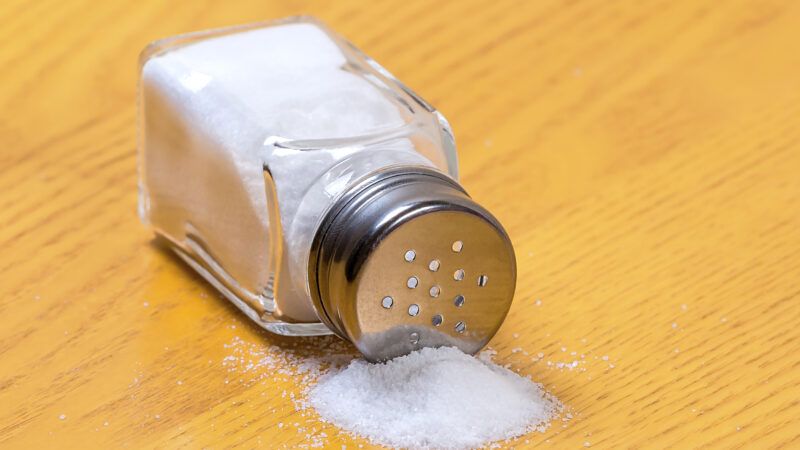The FDA Wants To Take Your Salt Away
Most Americans are not consuming excessive amounts of sodium.

The Food and Drug Administration has issued voluntary guidance that aims to limit the amount of sodium that restaurants and grocery manufacturers put in the foods you buy so that you won't consume more than 3,000 milligrams per day (mg/day). Most of the sodium we consume comes from table salt. Currently, Americans consume about 3,400 mg/day of sodium. As justification for its guidance, the FDA points to the U.S. Department of Agriculture's Dietary Guidelines for Americans, which advises individuals 14 years and older to limit their consumption to 2,300 mg/day. That amounts to a little over one teaspoon of salt per day.
The FDA doesn't want to go quite that far. The agency explains:
This guidance aims to help Americans reduce average sodium intake to 3,000 mg/day by encouraging food manufacturers, restaurants, and food service operations to gradually reduce sodium in foods over time. Although we recognize that a reduction to 3,000 mg/day still would be higher than the recommended sodium limit of 2,300 mg/day, the 2.5-year goals are intended to balance the need for broad and gradual reductions in sodium and what is publicly known about technical and market constraints on sodium reduction and reformulation.
The ostensible goal of limiting salt consumption is to reduce the incidence of high blood pressure and heart disease in Americans. The FDA states that there is a consensus among nutrition researchers that such limits will achieve those goals. In fact, that "consensus" is a highly contested area of research which a great deal of recent data contradicts.
For example, a June 2021 study in the European Heart Journal looked at average sodium intake in 181 countries and reported that higher daily per capita consumption correlated with longer life expectancy and lower rates of all-cause mortality.
An accompanying editorial noted that more than a dozen recent epidemiological studies have shown that the low sodium intake recommended by the FDA compared with the current average consumption is "not associated with lower risk of cardiovascular events and mortality, and may even be associated with an increased risk." Specifically, one study found that a moderate intake of between 3,000 and 5,000 mg/day was optimal while lower and higher consumption was associated with greater risk of mortality and cardiovascular disease. As the editorial observes, the results of a few randomized trials of sodium restriction are expected later this year that "will hopefully clarify whether or not sodium reduction should be recommended and, if so, the optimal range of sodium intake compatible with human health."
Keep firmly in mind that this study is reporting observational evidence at the population level. Ample research backs the finding that reducing sodium intake will reduce blood pressure, especially in people with hypertension. It is most likely the case that some subset of Americans may be especially salt sensitive and would benefit from consuming less. Better tests should be devised to identify such people so that the rest of us can consume our sodium in peace. As always folks, if your goal is to protect your health, strive for moderation in what you eat and drink.
